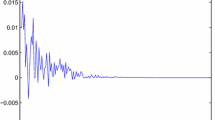Abstract
This paper addresses how to numerically solve the Hamilton-Jacobin-Isaac (HJI) equations derived from the robust receding horizon control schemes. The developed numerical method, the finite difference scheme with sigmoidal transformation, is a stable and convergent algorithm for HJI equations. A boundary value iteration procedure is developed to increase the calculation accuracy with less time consumption. The obtained value function can be applied to the robust receding horizon controller design of some kind of uncertain nonlinear systems. In the controller design, the finite time horizon is extended into the infinite time horizon and the controller can be implemented in real time. It can avoid the on-line repeated optimization and the dependence on the feasibility of the initial state which are encountered in the traditional robust receding horizon control schemes.
Similar content being viewed by others
References
Lee J, Yu Z. Worst-case formulations of model predictive control for systems with bounded parameters. Automatica, 1997, 33: 763–781
Basar T, Bernhard P. H ∞-optimal Control and Related Minimax Problems. Boston: Birkhäuser, 1991
Elliott R, Kalton N. Existence of value in differential games. Ser Memoires of the American Mathematical Society. Providence, Rhode Island: American Mathematical Society, 1972. 126
Henson M. Nonlinear model predictive control: current status and future directions. Comput Chem Eng, 1998, 23: 187–202
Garcia C, Prett D, Morari M. Model predictive control: theory and practice-a survey. Automatica, 1989, 57: 265–293
Morari M, Lee J. Model predictive control: past, present and future. Comput Chem Eng, 1999, 23: 667–682
Chen H, Allgöwer F. A quasi-infinity horizon nonlinear model predictive control scheme with guaranteed stability. Automatica, 1998, 34: 1205–1217
Rawlings J, Muske K. The stability of constrained receding horizon control. IEEE Trans Autom Control, 1993, 38: 1512–1516
Rawling J, Meadows E, Muske K. Nonlinear model predictive control: a tutorial and survey. In: Proceedings of IFAC ADCHEM. Kyoto, Japan, 1994. 185–197
Richalet J. Industrial applications of model based predictive control. Automatica, 1993, 29: 1251–1274
Richalet J, Testud L, Papon J. Model predictive heuristic control: Application to industrial processes. Automatica, 1978, 14: 413–428
Bitmead R, Gevers M, Wertz V. Adaptive Optimal Control: The Thinking Man’s GPC. New York: Prentice Hall, 1990
Polak E, Yang T. Moving horizon control of linear systems with input saturation and plant uncertainty part 1. Robustness. Int J Control, 1993, 58: 613–638
Mayne D, Michalska H. Receding horizon control of nonlinear system. IEEE Trans Autom Control, 1990, 35: 814–824
Michalska H, Mayne D. Robust receding horizon control of constrained nonlinear system. IEEE Trans Autom Control, 1993, 38: 1623–1633
Campo P, Morari M. Robust model predictive control. In: Proceedings of American Control Conference, Minneapolis. 1987. 1021–1026
Camacho E, Bordóns C. Model Predictive Control. Berlin: Springer-Verlag, 1999
Kothare M, Balakrishnan V, Morari M. Robust constrained model predictive control using linear matrix inequalities. Automatica, 1996, 32: 1361–1379
Mhaskar P, El-Farra N, Christofides P. Predictive control of switched nonlinear systems with scheduled mode transitions. IEEE Trans Autom Control, 2005, 50: 1670–1680
Song C. Numerical optimization method for HJB equations with its application to receding horizon control schemes. In: Proceedings of IEEE Conference on Decision and Control, Shanghai, China, 2009. 333–338
Song C, Ye J, Liu D, Kang Q. Generalized receding horizon control of fuzzy systems based on numerical optimization algorithm. IEEE Trans Fuzzy Syst, 2009, 17: 1336–1352
Kushner H, Dupuis P. Numerical Methods for Stochastic Control Problems in Continuous Time. 2nd ed. New York: Springer-Verlag, 2001
Kushner H. Numerical approximations for stochastic differential games. SIAM J Control Optim, 2002, 41: 457–486
Song Q S. Convergence of markov chain approximation on generalized HJB equation and its applications. Automatica, 2008, 44: 761–766
Evans L, Souganidis P. Differential games and representation formulas for solutions of Hamilton-Jacobi-Isaacs equations. Indiana Univ Math J, 1984, 33: 773–797
Fleming W, Soner H. Controlled Markov Processes and Viscosity Solutions. 2nd ed. New York: Springer-Verlag, 2006.
Barles G, Souganidis P. Convergence of approximation schemes for fully nonlinear second order equations. J Asympt Anal, 1991, 4: 271–283
Souganidis P. Two-player zero-sum differential games and viscosity solutions. In: Bardi M, Raghavan T, Parthasarathy T, eds. Stochastic and Differential Games: Theory and Numerical Methods, Ser Annals of International Society of Dynamic Games. Boston: Birkhäuser, 1999, 4: 69–104
Ye J. Optimal life insurance purchase, consumption and portfolio under an uncertain life. PhD Thesis. USA: University of Illinois at Chicago, 2006
Bellman R. Dynamic Programming. 3rd ed. Princeton NJ: Princeton University Press, 1962
Isidori A. Nonlinear Control system-an Introduction. 2nd ed. Berlin: Spring Verlag, 1989
Author information
Authors and Affiliations
Corresponding author
Rights and permissions
About this article
Cite this article
Song, C., Bian, C., Zhang, X. et al. Numerical optimization method for HJI equations derived from robust receding horizon control schemes and controller design. Sci. China Inf. Sci. 55, 214–227 (2012). https://doi.org/10.1007/s11432-011-4403-8
Received:
Accepted:
Published:
Issue Date:
DOI: https://doi.org/10.1007/s11432-011-4403-8




